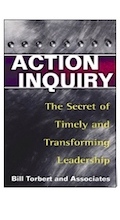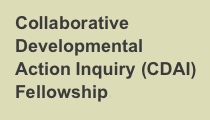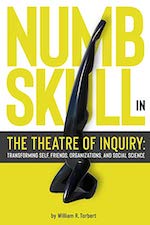How is action inquiry a profoundly different leadership skill and capacity from anything offered via courses, workshops, coaching,and consultation based on other theories and practices? And how can we at AIA claim to be effective at supporting you to engage in timely and transforming leadership action?
First, AIA’s approach is powerful because the theory and practice of CDAI (Collaborative Developmental Action Inquiry, to use its full, formal name) is no simple technique or one-time “fix.” Rather, CDAI is a lifelong form of learning, supporting multiple leadership, organizational, or communal transformations that repeatedly expand and intensify one’s awareness, one’s time horizon, and the scale and types of power at the community’s disposal.
Second, AIA’s approach is powerful because CDAI spans three scales and types of action inquiry: 1) internal, subjective, spiritual inquiry and practice; 2) interpersonal, intersubjective, political inquiry and practice; and 3) external, objective, scientific inquiry and practice. And…
Third, AIA’s approach is powerful because CDAI aims to generate living communities of inquiry among senior management teams, professional communities of practice, and friendship circles.
Finally, fourth and most importantly, we at AIA base our claim to be able to support your own and your organization’s development:
1) on the powerful statistical results of scientific studies of our own previous activities;
2) on the active spiritual paths that different ones of us pursue (Buddhism, Ignatian Exercises, the Gurdjieff Work, etc.);
and
3) on our joint work of challenging and supporting one another and inventing new activity structures at our Alchemists’ Workparties and our Action Inquiry Fellows’ Gatherings.
Further Detail about AIA’s Current Development
Indeed, our joint work is leading us to invent an entirely new way of organizing economically, politically, and spiritually that we are trying out first on ourselves. At our most recent AI Fellows Gathering, we have pioneered a new form of post-capitalist, post-corporate, inter-independent community. You may recall that in earlier blogs, I have focused primarily on the four Action Inquiry Associates who gave our work its initial definition. Well, our organization has now transformed, with more of the Fellows playing more active Associates roles, and with the design of three organizing principles, one primarily economic, one primarily political, and one primarily spiritual.
The primary economic principle our Fellowship has agreed on is: All Fellows operate as sole proprietors or limited liability corporations in relation to one another; thus, any Fellow may explore working for an agreed-upon fee with any other Fellow, and/or may offer other Fellows such fees as s/he wishes in a solo or trio venture s/he co-generates.
The primary political principle our Fellowship has agreed upon is: Leadership within the Fellowship community comes in the form of Trios who volunteer to lead a particular activity (because a trio is the smallest organizing unit that can demonstrate [or fail to demonstrate] collaborative developmental action inquiry in its ongoing practice). In our case, for example, we now have a Consulting Trio, a GLP Trio, an Action Inquiry Fieldbook Trio, a Fellowing Trio [for governance] etc.), with others volunteering as contributors and potentially earning fees if/when that activity produces revenues. (If no one volunteers for a proposed activity, or only one or two, the activity itself will not begin until a Trio Bubble, responsible for keeping the activity “bubbling,” is formed [with a statement of intent and an invitation for contributors to join].)
The primary spiritual principle we have agreed upon, and even said out loud together, is the commitment prospective Fellows are asked to make when invited to join the Fellowship:
“We commit to enacting the vision of:
TIMELY ACTION INQUIRY
that grows Personal INTEGRITY,
Relational MUTUALITY
& mutually-transforming power, as well as
Non-violent, ecological SUSTAINABILITY across generations.”
You may feel that it’s difficult to imagine why these would become the primary economic, political, and spiritual principles for a voluntary, inter-independent community. Or some others of you may feel an immediate intuitive resonance with these principles. In either event, they are truly strange principles to today’s global communities (whether your company or country be autocratic or democratic; whether your economy be a state-guided or a business-guided stock-market; or whether your spirituality be protestant-secular or orthodox-religious).
Over the past five centuries, Dependency-Oriented families and kingdoms have gradually yielded their primacy as the paradigm for organizing to Independence-Oriented corporations and democratic governments. Although both Dependent familial and Independent corporate forms will no doubt continue to function in the future, will voluntary, Inter-Independent forms of community emerge as a new guiding paradigm for creating good work and the good life among us?
On behalf of the Action Inquiry Fellows and Associates, I invite you to find ways to join us in exploring the universe of action inquiry.








{ 0 comments… add one now }